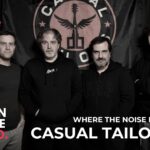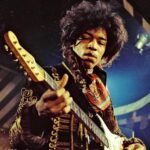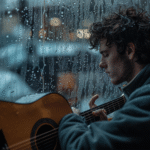Now Reading: How Kota the Friend Built a Career
-
01
How Kota the Friend Built a Career
How Kota the Friend Built a Career

Kota the Friend opens up about growing up in Brooklyn, building a creative life on his own terms, approaching songwriting by channeling emotion, and why he treats each song like a sculpture.
The following recaps an interview with Kota the Friend as part of Downtown Music’s series, The Music Industry Lives Here. Downtown Music is a company DMN is proud to be partnering with.
“When I was a kid, music came from many different places. My brother was a big fan of Jay-Z, and I used to steal his CDs. When LimeWire came out, I was stealing from everybody else, so I didn’t have to steal from him anymore. But that allowed me to listen to a lot of music.”
Kota recalls being at home with his mom and dad on Sundays. “We’d spend time with the family, playing old school music. We’re living in the old days, obscure soul songs that nobody would even know, from artists that you wouldn’t even recognize.”
“I remember how important BET (Black Entertainment Television) was for us, and watching 106 & Park Countdown was our religion. That made us want to discover more. That made us want to write our own music.”
But it was high school that opened up a new world of music for Kota. “I was meeting new people, and I was introduced to rock music. It was the first time I really listened to the Beatles, the Doors, and many other artists. That’s where I evolved.”
Kota also gave a shout-out to all the technology that allowed him to listen to music he didn’t grow up with. “The music I was listening to was very different. I didn’t even want to tell others what I was listening to. When you’re in school, you don’t really want to be different. You want to fit in.”
“Everybody else’s music taste was very current. I was listening to Reasonable Doubt, Jay-Z’s first album. Everybody’s listening to whatever’s hot. And I was never the type of person who listened to whatever’s hot. I was into different stuff.”
“I had a friend who put me on Lincoln Park. But he knew I was a Jay-Z head. So, our relationship really got super tight when Jay-Z and Lincoln Park did an album together. Those are some of our favorite moments.”
Kota reveals that the journey to finding your own sound is fascinating. “As an artist, it’s essential to find your sound; you really have to dig deep into who you are. It’s not always easy. It requires many tough conversations. My artistic journey and my life journey have been the same. My music is a reflection of what I’m really going through or how I’m really feeling. It’s a complete roller coaster.”
Speaking about his music production, Kota says, “I always need a beat. The music makes me feel something. Then I can write a verse about something going on in my life, or something I want to get off my chest, or something I want to address in society.”
“Songwriting is a form of sculpting. It’s like you start with a big block and chisel it down to get to the details.”
“Sometimes I have a sample and some drums. I don’t add any bass because I don’t know what it will be yet. I add the lyrics before I add the rest of the production because I want it all to make sense together. When you have something that’s somewhat of a blank canvas, you have more to work with as a writer.”
On one thing that really changed the way Kota wrote music, he says, “It was a realization that something new had to happen every few seconds in a song. A song is a series of moments. The more moments you can have in a song, the better the song is.”
That’s another detail ‘you chiseled into the block.’ “You have dope lyrics, and that’s great, but now it’s about how to turn this into a bigger moment that the people around me can connect to and appreciate.”
Inspiration is the way to create a better track, and there’s not much that doesn’t inspire Kota. “Life is beautiful. The bricks on this building inspire me. Plants and nature, landscapes and other artists inspire me. My family inspires me. My feelings about life, as well as the situations I encounter and my friends inspire me. And so, there’s very little that doesn’t inspire me.”
Speaking about his first live show in LA, Kota says, “It’s 2016. I was sleeping on my friend’s couch. I bought my own ticket from New York to LA. I still remember the couch. I still remember what everything looked like. These things you can’t forget.”
At the venue, there was a line around the corner. “I was like, ‘bro, I think that line’s for me.’ And he goes, ‘Bro, they have a lot of shows in here, so it could be a different show.’”
“He tried to humble me real quick, but then we walked up to the venue and everybody was screaming my name, and they were saying, Kota, Kota, Kota.”
“That was the first time I’d ever experienced having fans. That was the first time I encountered people who had been listening to my music, and now they were at the show, ready to support me and see me perform. That changed my life.”
That was a big confidence boost for Kota. “All these miles away from home, and these people are here to see me do a show, and these people know the words to my music.”
“I made it and got myself some land. I tell them I’m home, but really I’m out of state.”
Kota loves the freedom that comes with being independent. “Being independent has completely changed my trajectory compared to an artist who’s signed or even on a distribution deal.”
“I’ve been blessed with freedom. That’s priceless: being able to drop a song today and nobody can say anything about it. And not only that, but I could drop a song on any distribution company that I went to.”
“That freedom is different. It has allowed me to make so many moves and be quick with them, and benefit 100% from my music – versus somebody who’s on a label where they may only be getting 15% of their music and royalties.”
“People need education. They need to hear about the inner workings and what they can do. There are many artists out there who aren’t collecting their royalties. Don’t downplay yourself.”
About The Music Industry Lives Here: Downtown Music’s interview series allows powerful conversations with the voices shaping the music industry. To gain weekly access to exclusive interviews with music executives, artists, record label owners, and influential figures who drive the rhythm of the industry, join here.
























